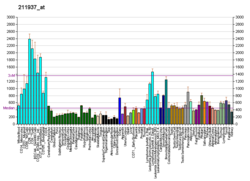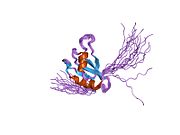Protein-coding gene in humans
Eukaryotic translation initiation factor 4B is a protein that in humans is encoded by the EIF4B gene .[ 5]
Interactions eIF4B has been shown to interact with and stimulate the activity of eIF4A and bind to the eIF3 complex through the eIF3A subunit.[ 6] eukaryotic small ribosomal subunit (40S) to the mRNA which will in turn set the stage for the later steps leading to elongation .
See also
References
Further reading
van Heugten HA, Kasperaitis MA, Thomas AA, Voorma HO (1991). "Evidence that eukaryotic initiation factor (eIF) 2 is a cap-binding protein that stimulates cap recognition by eIF-4B and eIF-4F" . J. Biol. Chem . 266 (11): 7279–84. doi :10.1016/S0021-9258(20)89641-0 PMID 2016328 . Milburn SC, Hershey JW, Davies MV, Kelleher K, Kaufman RJ (1990). "Cloning and expression of eukaryotic initiation factor 4B cDNA: sequence determination identifies a common RNA recognition motif" . EMBO J . 9 (9): 2783–90. doi :10.1002/j.1460-2075.1990.tb07466.x . PMC 551988 PMID 2390971 . Howe JG, Hershey JW (1984). "Translational initiation factor and ribosome association with the cytoskeletal framework fraction from HeLa cells" . Cell . 37 (1): 85–93. doi :10.1016/0092-8674(84)90303-9 PMID 6722878 . Maruyama K, Sugano S (1994). "Oligo-capping: a simple method to replace the cap structure of eukaryotic mRNAs with oligoribonucleotides". Gene . 138 (1–2): 171–4. doi :10.1016/0378-1119(94)90802-8 . PMID 8125298 . Méthot N, Pause A, Hershey JW, Sonenberg N (1994). "The translation initiation factor eIF-4B contains an RNA-binding region that is distinct and independent from its ribonucleoprotein consensus sequence" . Mol. Cell. Biol . 14 (4): 2307–16. doi :10.1128/mcb.14.4.2307 . PMC 358597 PMID 8139536 . Naranda T, Strong WB, Menaya J, Fabbri BJ, Hershey JW (1994). "Two structural domains of initiation factor eIF-4B are involved in binding to RNA" . J. Biol. Chem . 269 (20): 14465–72. doi :10.1016/S0021-9258(17)36646-2 PMID 8182051 . Méthot N, Song MS, Sonenberg N (1996). "A region rich in aspartic acid, arginine, tyrosine, and glycine (DRYG) mediates eukaryotic initiation factor 4B (eIF4B) self-association and interaction with eIF3" . Mol. Cell. Biol . 16 (10): 5328–34. doi :10.1128/MCB.16.10.5328 . PMC 231531 PMID 8816444 . Suzuki Y, Yoshitomo-Nakagawa K, Maruyama K, Suyama A, Sugano S (1997). "Construction and characterization of a full length-enriched and a 5'-end-enriched cDNA library". Gene . 200 (1–2): 149–56. doi :10.1016/S0378-1119(97)00411-3 . PMID 9373149 . Richter NJ, Rogers GW, Hensold JO, Merrick WC (1999). "Further biochemical and kinetic characterization of human eukaryotic initiation factor 4H" . J. Biol. Chem . 274 (50): 35415–24. doi :10.1074/jbc.274.50.35415 PMID 10585411 . Bushell M, Wood W, Clemens MJ, Morley SJ (2000). "Changes in integrity and association of eukaryotic protein synthesis initiation factors during apoptosis" . Eur. J. Biochem . 267 (4): 1083–91. doi :10.1046/j.1432-1327.2000.01101.x PMID 10672017 . Bushell M, Wood W, Carpenter G, Pain VM, Morley SJ, Clemens MJ (2001). "Disruption of the interaction of mammalian protein synthesis eukaryotic initiation factor 4B with the poly(A)-binding protein by caspase- and viral protease-mediated cleavages" . J. Biol. Chem . 276 (26): 23922–8. doi :10.1074/jbc.M100384200 PMID 11274152 . Fleming K, Ghuman J, Yuan X, Simpson P, Szendröi A, Matthews S, Curry S (2003). "Solution structure and RNA interactions of the RNA recognition motif from eukaryotic translation initiation factor 4B". Biochemistry . 42 (30): 8966–75. doi :10.1021/bi034506g . PMID 12885229 . Raught B, Peiretti F, Gingras AC, Livingstone M, Shahbazian D, Mayeur GL, Polakiewicz RD, Sonenberg N, Hershey JW (2004). "Phosphorylation of eucaryotic translation initiation factor 4B Ser422 is modulated by S6 kinases" . EMBO J . 23 (8): 1761–9. doi :10.1038/sj.emboj.7600193 . PMC 394247 PMID 15071500 . Doepker RC, Hsu WL, Saffran HA, Smiley JR (2004). "Herpes simplex virus virion host shutoff protein is stimulated by translation initiation factors eIF4B and eIF4H" . J. Virol . 78 (9): 4684–99. doi :10.1128/JVI.78.9.4684-4699.2004 . PMC 387725 PMID 15078951 . Beausoleil SA, Jedrychowski M, Schwartz D, Elias JE, Villén J, Li J, Cohn MA, Cantley LC, Gygi SP (2004). "Large-scale characterization of HeLa cell nuclear phosphoproteins" . Proc. Natl. Acad. Sci. U.S.A . 101 (33): 12130–5. Bibcode :2004PNAS..10112130B . doi :10.1073/pnas.0404720101 PMC 514446 PMID 15302935 . Suzuki Y, Yamashita R, Shirota M, Sakakibara Y, Chiba J, Mizushima-Sugano J, Nakai K, Sugano S (2004). "Sequence comparison of human and mouse genes reveals a homologous block structure in the promoter regions" . Genome Res . 14 (9): 1711–8. doi :10.1101/gr.2435604 . PMC 515316 PMID 15342556 . Shahbazian D, Roux PP, Mieulet V, Cohen MS, Raught B, Taunton J, Hershey JW, Blenis J, Pende M, Sonenberg N (2006). "The mTOR/PI3K and MAPK pathways converge on eIF4B to control its phosphorylation and activity" . EMBO J . 25 (12): 2781–91. doi :10.1038/sj.emboj.7601166 . PMC 1500846 PMID 16763566 . Olsen JV, Blagoev B, Gnad F, Macek B, Kumar C, Mortensen P, Mann M (2006). "Global, in vivo, and site-specific phosphorylation dynamics in signaling networks" . Cell . 127 (3): 635–48. doi :10.1016/j.cell.2006.09.026 PMID 17081983 . S2CID 7827573 .








